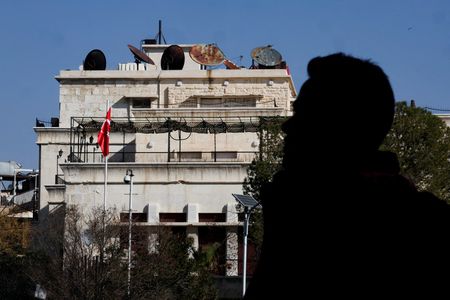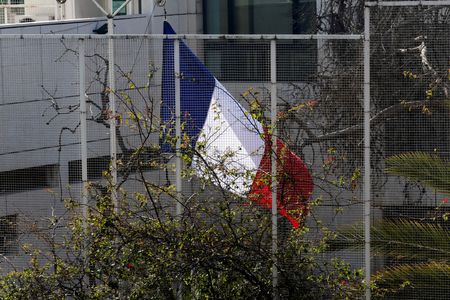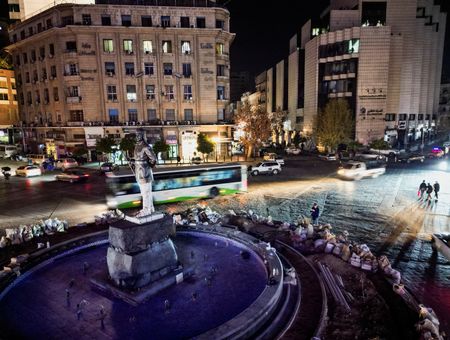DAMASCUS (Reuters) -German and French officials are due to meet representatives of Syria’s new governing authorities in Damascus on Tuesday, expanding Western contacts with the new administration after British diplomats met its leader Ahmed al-Sharaa late on Monday.
Nine days after Bashar al-Assad was ousted, the new prime minister installed by Sharaa’s Islamist Hayat Tahrir al-Sham (HTS) group said the government was grappling with very low currency reserves and called for sanctions to be lifted.
Western states are gradually opening channels to the new authorities in Damascus led by HTS, though they continue to designate it as a terrorist group.
Late on Monday, Sharaa, formerly known by his nom de guerre Abu Mohammed al-Golani, met a British foreign ministry delegation. He stressed the need for the restoration of ties and lifting sanctions on Syria so that Syrian refugees can return home, the Syrian state news agency SANA reported.
Photos published by SANA showed Sharaa, whose group was part of al Qaeda until he broke ties in 2016, sitting in a suit with an open shirt during the meeting, his highest level encounter yet with a Western government official since HTS seized power.
The images underline the geopolitical shift since Assad was toppled by HTS-led forces, a blow to Assad’s Russian and Iranian allies which could potentially open the way for Western states to reopen contacts with Damascus.
But for now at least, any Western overtures require manoeuvring around both the terrorism designation imposed on HTS during its days as an al Qaeda affiliate and financial sanctions imposed on Damascus under Assad.
Sharaa “spoke about the need to build a state of law and institutions, and establishing security,” SANA reported. “He also spoke about Britain’s important role internationally.”
Ahead of the meeting, British foreign minister David Lammy said London had sent a delegation of senior officials to Damascus to meet with the new interim Syrian authorities and civil society groups.
German diplomats are also planning talks with representatives of HTS in Damascus on Tuesday, the German foreign ministry said.
A German foreign ministry spokesperson said the talks would focus on a transitional process for Syria and the protection of minorities.
“The possibilities of a diplomatic presence in Damascus are also being explored there,” the spokesperson added in a statement, reiterating that Berlin was monitoring HTS closely in light of its roots in al Qaeda ideology.
“As far as one can tell, they have acted prudently so far,” the spokesperson said.
The new administration in Damascus has set out few details on its thinking for the next steps, even as it has swiftly established control over state institutions.
‘THE JUSTICE OF ISLAM’
In an interview with Al Jazeera Mubasher, the newly installed Prime Minister Mohammed al-Bashir said the defence ministry would be restructured using using former rebel factions and officers who defected from Assad’s army.
Asked what he would say to those worried about a single religious or political group dominating Syria, Bashir said: “Those who are afraid…of a religion trend or anything else doesn’t truly understand Islam, the forgiveness of Islam, the justice of Islam”.
“Syria is for all Syrians,” he said. “Everyone is a partner for us building the Syria of the future.”
Bashir, who formerly led an HTS-affiliated government in Idlib province, has said he will remain in office until March.
EU foreign policy chief Kaja Kallas said on Monday the European Union should be ready to ease sanctions on Syria if the country’s new leadership takes “positive steps” to establish an inclusive government and respect women’s and minority rights.
The Syrian conflict, which spiralled out of 2011 uprising against Assad’s repressive rule, drove millions of Syrians abroad as refugees, including around 1 million who went to Germany.
French diplomats are also expected to visit Damascus later on Tuesday to meet HTS representatives, French officials said.
The U.S. State Department said on Monday that the U.S. government has had more than one communication with Hayat Tahrir al-Sham (HTS) over the past week.
(Reporting by Rachel More in Berlin, Maya Gebeily in Beirut; Nayera Abdallah and Clauda Tanios in Dubai; Writing by Tom PerryEditing by Peter Graff and Angus MacSwan)


